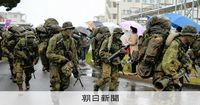On April 3, 2025, the Japan Ground Self-Defense Force (JGSDF) announced a significant change in its ranger training program, a decision that reflects both the need for modernization and the imperative of safety. The military branch revealed that it would temporarily suspend ranger training for several units, a move designed to address both contemporary warfare requirements and the alarming series of accidents that have occurred during training.
Rangers, considered elite members of the JGSDF, undergo some of the most rigorous training in the military. This training, which lasts approximately three months, is designed to prepare them for infiltrating enemy territory and executing challenging missions. The training regimen is notorious, involving extreme physical challenges, such as running with firearms, limited food intake, and survival tactics, including identifying edible plants while remaining hidden in mountainous terrains.
General Yasutake Morishita, Chief of Staff of the JGSDF, spoke at a press conference on April 3, where he elaborated on the reasons behind this unprecedented suspension. He stated, "There have been a series of accidents, and we want to take this opportunity to fully reflect on safety and health management and conduct new education." Morishita emphasized that the review of the training program would incorporate the latest technology, such as drones, to ensure that the JGSDF can effectively respond to modern warfare scenarios.
The decision comes after a series of tragic incidents involving ranger trainees. In September 2021, a man in his 30s from the 8th Division of the JGSDF died from severe heatstroke during training. More recently, in August 2024, a male trainee in his 20s at the Fukuchiyama Garrison in Kyoto Prefecture succumbed after reporting feeling unwell. These incidents have raised serious concerns regarding the safety protocols in place during the demanding training.
As the JGSDF moves forward with this suspension, it will affect all units except for the Fuji School, the 1st Airborne Brigade, and the Amphibious Rapid Deployment Brigade, which will continue their training programs. The overall goal is to reassess and enhance the educational content to better align with the needs of modern combat.
The ranger training program has a long history, having been established in 1958. It has evolved over the decades, but the current decision marks the first long-term suspension of its kind, set to last until March 2026. This significant pause is not merely a reaction to past incidents but a proactive measure aimed at improving the future of military training.
Morishita explained that halting the program temporarily was deemed the most effective way to transition to a new system swiftly. He noted, "In order to shift to a new system as soon as possible, we have decided that it would be more effective to temporarily stop the education." This statement underscores the JGSDF's commitment to ensuring that its personnel are not only well-trained but also safe.
As the JGSDF reviews its training protocols, the focus will also be on enhancing safety measures to prevent further accidents. The push for modernization and safety comes at a time when military forces worldwide are adapting to new technologies and methodologies in warfare.
The suspension of ranger training has sparked discussions among military officials and the public alike. Many express support for the decision, recognizing the importance of safety and the need for a training program that reflects the realities of modern combat. Others, however, worry about the implications for troop readiness and the potential delay in developing new rangers who are essential for the JGSDF's operational capabilities.
As this situation unfolds, the JGSDF is tasked with balancing the urgent need for modernization with the pressing responsibility of ensuring the safety and well-being of its service members. The upcoming months will be critical as the military branch works to create a training program that not only prepares its personnel for the challenges of modern warfare but does so in a manner that prioritizes their health and safety.
The future of the JGSDF's ranger training program remains uncertain, but the commitment to improvement is clear. As General Morishita stated, this is an opportunity to reflect on past practices and implement changes that will benefit the force in the long run. With the right adjustments, the JGSDF aims to cultivate a new generation of rangers who are not only capable but also safe as they undertake their demanding roles.








